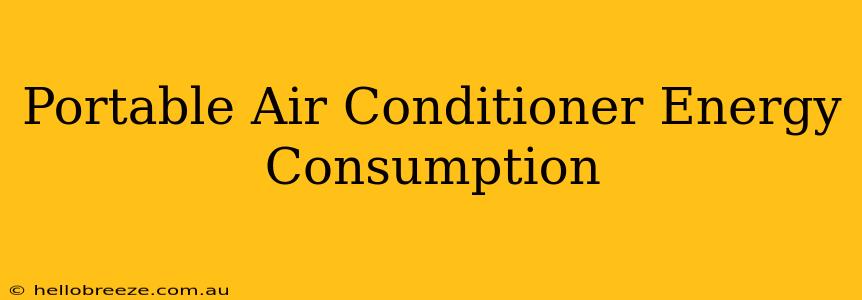Summer heat can be unbearable, making a portable air conditioner a tempting solution. But before you rush out to buy one, it's crucial to understand portable air conditioner energy consumption. These units, while convenient, can significantly impact your energy bill if you're not careful. This guide will break down everything you need to know about energy efficiency and help you make an informed decision.
Understanding the Energy Use of Portable AC Units
Portable air conditioners, unlike window units or central AC systems, aren't known for their stellar energy efficiency. This is primarily due to their design and functionality. They typically use more energy to cool a space compared to their more permanently installed counterparts. Several factors contribute to this higher energy consumption:
1. Heat Exhaust: The Major Culprit
Portable AC units work by drawing in warm air, cooling it, and then expelling the hot air outside. This hot air exhaust is often less efficient than the exhaust systems in window or central units. The heat exhaust process itself consumes a considerable amount of energy. The more frequently the unit runs, the higher the energy bill will be.
2. Inefficient Cooling Methods
While advancements in technology have led to improved efficiency, many portable AC units still utilize less efficient cooling methods than their window or central counterparts. Understanding the cooling methods and their energy demands is essential. Look for models with high Energy Efficiency Ratios (EERs) for better performance.
3. Size and Room Dimensions
The size of your portable air conditioner significantly impacts its energy consumption. Oversized or undersized units can both lead to increased energy use. An undersized unit will struggle to cool the space effectively, running constantly and consuming more energy. An oversized unit, conversely, will cool too quickly and cycle on and off frequently, also leading to increased energy usage. Proper sizing is critical for energy efficiency.
Tips for Reducing Portable AC Energy Consumption
While portable AC units inherently use more energy than some other types, several strategies can help minimize their impact on your energy bill:
1. Maximize Energy Efficiency
- Choose a unit with a high EER: The Energy Efficiency Ratio (EER) measures how much cooling you get per watt of electricity. A higher EER indicates greater efficiency.
- Regular maintenance: Keep your unit clean. Dirty filters restrict airflow and reduce cooling efficiency, increasing energy consumption. Regular cleaning is crucial for energy saving.
- Proper ventilation: Ensure adequate ventilation in the room to allow efficient heat exchange. Closed windows and doors will improve cooling efficiency and reduce energy usage.
2. Strategic Use of Your Portable AC
- Cool only the necessary space: Don't try to cool an entire house with a portable AC unit designed for a smaller area.
- Use it strategically: Turn the unit off when leaving the room or when it's not needed.
- Consider the ambient temperature: On cooler days, use fans instead of the air conditioner to save energy.
3. Supplementary Measures
- Insulation: Proper insulation in your home helps to reduce the amount of heat entering the space, reducing the workload on your portable air conditioner.
- Window coverings: Blocking sunlight with curtains or blinds can significantly decrease heat gain and lower cooling demands.
Choosing the Right Portable Air Conditioner
The key to reducing portable air conditioner energy consumption starts with choosing the right unit. Consider these factors:
- Room size: Carefully measure the square footage of the room you want to cool.
- EER rating: Select a unit with the highest EER rating within your budget.
- Features: Look for features like adjustable thermostats and sleep modes, which can help you save energy.
By understanding the factors that contribute to portable air conditioner energy consumption and following these tips, you can enjoy the comfort of cool air without breaking the bank. Remember, responsible usage and smart choices significantly influence your energy bills.

